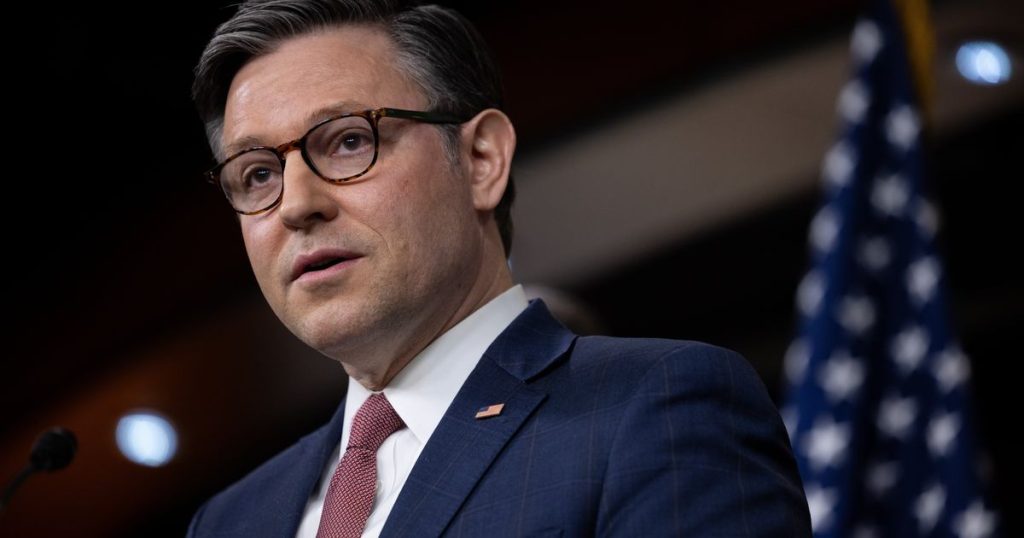House Republican Budget Plan Sparks Controversy Over Tax Cuts and Social Program Cuts
House Republicans recently unveiled a contentious budget plan that has sparked widespread debate over its proposed $4.5 trillion in tax cuts over the next decade. While the plan aims to reduce taxes significantly, particularly for corporations and wealthy individuals, it also seeks to offset the cost of these cuts by making deep reductions to social programs that serve low-income Americans. Critics argue that these cuts could harm millions of vulnerable individuals who rely on programs like Medicaid and the Supplemental Nutrition Assistance Program (SNAP). Republicans, however, insist that their plan is designed to promote economic growth and encourage more Americans to join the workforce.
The budget outline does not specify which programs will be cut, but analysts suggest that Medicaid, which provides health insurance to over 70 million low-income Americans, is likely in the crosshairs. House Speaker Mike Johnson (R-La.) has floated the idea of rooting out fraud in these programs and imposing work requirements to save money. He emphasized that the goal is to push more people into the workforce, stating, “Work is good for you. You find dignity in work. And the people that are not doing that, we’re going to try to get their attention.” Despite these assurances, the proposed spending cuts are expected to go far beyond what can be achieved through work requirements or fraud prevention, raising concerns about the impact on those who depend on these programs.
Medicaid and SNAP Face Potential Deep Cuts
The budget resolution instructs the House Energy and Commerce Committee to find $880 billion in savings over the next ten years, a figure that has led many to believe Medicaid will be significantly impacted. Republicans have long targeted Medicaid, often proposing measures like work requirements or per capita caps that would limit federal spending on the program. Past attempts to impose work requirements have led to substantial reductions in Medicaid enrollment, often hurting individuals who qualify for the program but struggle to meet reporting requirements. Experts warn that the proposed cuts could leave millions of Americans without health insurance, exacerbating existing health disparities.
In addition to Medicaid, SNAP, which provides food assistance to low-income families, may also face cuts. Republicans have framed these changes as necessary to reduce government spending and incentivize work, but critics argue that such measures will disproportionately harm vulnerable populations. Democratic lawmakers, such as Rep. Brendan Boyle (D-Pa.), have slammed the plan, accusing Republicans of prioritizing “massive giveaways for giant corporations and billionaires” over critical programs that support hardworking Americans.
Economic Growth vs. Deficit Concerns
Republicans argue that the tax cuts will stimulate economic growth, which will, in turn, generate enough revenue to offset the cost of the cuts. However, this reasoning has been met with skepticism from budget experts, who describe the math behind the plan as “fantasy.” While Republicans have historically criticized large budget deficits, they have acknowledged that their current plan does not fully offset the cost of the tax cuts. Instead, they are betting on the economic benefits of tax reform to make up the difference.
This approach has created tension within the Republican Party, with some lawmakers pushing for deeper spending cuts and others expressing concerns that the proposed reductions go too far. The Senate is advancing its own budget plan, which focuses on border security, defense, and energy policy before addressing tax cuts. President Trump has not yet indicated which approach he prefers, adding to the uncertainty. Given the slim Republican majority in the House, finding consensus will be a significant challenge.
Political and Policy Challenges Ahead
The budget resolution is just the first step in a lengthy legislative process. The House will vote on the resolution before negotiating with the Senate, which is likely to produce its own budget plan. Given the sharp disagreements within the Republican Party, and the fact that Democrats are firmly opposed to the proposed cuts, the path forward is fraught with challenges. Advocacy groups and experts are sounding the alarm about the potential consequences of the budget plan, particularly for Medicaid. They warn that the cuts could be even more severe than those proposed during the failed attempt to repeal the Affordable Care Act (ACA) in 2017.
If enacted, the plan could leave millions of Americans without access to health insurance, leading to poorer health outcomes and increased financial instability for low-income families. Critics argue that the proposed changes amount to “repeal without replacement,” stripping away critical protections and benefits without offering any alternative. As the budget debate unfolds, the stakes are high for the millions of Americans who rely on Medicaid, SNAP, and other social programs to make ends meet.
In conclusion, the Republican budget plan represents a significant shift in federal spending priorities, with tax cuts for the wealthy and corporations taking center stage while critical social programs face deep cuts. While the plan aims to promote economic growth and workforce participation, the human cost of these changes could be profound, leaving many vulnerable Americans without the support they need. As the legislative process moves forward, the debate over the budget will likely remain contentious, with Democrats and advocates pushing back against what they see as a misguided and harmful approach to governing.









